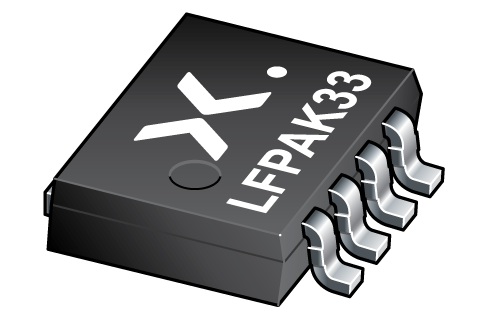
Register once, drag and drop ECAD models into your CAD tool and speed up your design.
Click here for more informationPSMN6R5-30MLD
N-channel 30 V, 6.5 mΩ logic level MOSFET in LFPAK33 using NextPowerS3 Technology
Logic level gate drive N-channel enhancement mode MOSFET in an LFPAK33 package. The NextPowerS3 portfolio, utilising Nexperia’s unique “SchottkyPlus” technology, delivers high efficiency and the low spiking performance usually associated with MOSFETs with an integrated Schottky or Schottky-like body diode but without problematic high leakage current. NextPowerS3 is particularly suited to high efficiency applications at high switching frequencies.
Features and benefits
- Ultra low QG, QGD and QOSS for high system efficiency, especially at higher switching frequencies
- Superfast switching with soft-recovery; s-factor > 1
- Low spiking and ringing for low EMI designs
- Unique “SchottkyPlus” technology; Schottky-like performance with < 1 μA leakage at 25 °C
- Optimised for 4.5 V gate drive
- Low parasitic inductance and resistance
- High reliability clip bonded and solder die attach Mini Power SO8 package; no glue, no wire bonds, qualified to 175 °C
- Exposed leads for optimal visual solder inspection
Applications
- On-board DC-to-DC solutions for server and telecommunications
- Secondary-side synchronous rectification in telecommunication applications
- Voltage regulator modules (VRM)
- Point-of-Load (POL) modules
- Power delivery for V-core, ASIC, DDR, GPU, VGA and system components
- Brushed and brushless motor control
參數類型
| 型號 | Package version | Package name | Product status | Channel type | Nr of transistors | VDS [max] (V) | RDSon [max] @ VGS = 10 V (mΩ) | RDSon [max] @ VGS = 4.5 V; @25 C (mΩ) | Tj [max] (°C) | ID [max] (A) | QGD [typ] (nC) | QG(tot) [typ] @ VGS = 4.5 V (nC) | QG(tot) [typ] @ VGS = 10 V (nC) | Ptot [max] (W) | Qr [typ] (nC) | VGSth [typ] (V) | Automotive qualified | Ciss [typ] (pF) | Coss [typ] (pF) | Release date |
|---|---|---|---|---|---|---|---|---|---|---|---|---|---|---|---|---|---|---|---|---|
| PSMN6R5-30MLD | SOT1210 | LFPAK33 | End of life | N | 1 | 30 | 6.5 | 8.6 | 175 | 65 | 1.7 | 6.4 | 13.6 | 51 | 12.6 | 1.68 | N | 817 | 605 | 2013-10-02 |
封裝
下表中的所有產品型號均已停產 。
| 型號 | 可訂購的器件編號,(訂購碼(12NC)) | 狀態 | 標示 | 封裝 | 外形圖 | 回流焊/波峰焊 | 包裝 |
|---|---|---|---|---|---|---|---|
| PSMN6R5-30MLD | PSMN6R5-30MLDX (934068066115) |
Obsolete |

LFPAK33 (SOT1210) |
SOT1210 |
REFLOW_BG-BD-1
|
SOT1210_115 |
文檔 (13)
| 文件名稱 | 標題 | 類型 | 日期 |
|---|---|---|---|
| PSMN6R5-30MLD | N-channel 30 V, 6.5 mΩ logic level MOSFET in LFPAK33 using NextPowerS3 Technology | Data sheet | 2019-08-13 |
| AN10874_ZH | LFPAK MOSFET thermal design guide, Chinese version | Application note | 2020-04-30 |
| AN11113_ZH | LFPAK MOSFET thermal design guide - Part 2 | Application note | 2020-04-30 |
| AN11261 | RC Thermal Models | Application note | 2021-03-18 |
| AN11599 | Using power MOSFETs in parallel | Application note | 2016-07-13 |
| AN90003 | LFPAK MOSFET thermal design guide | Application note | 2023-08-22 |
| AN90063 | Questions about package outline drawings | Application note | 2025-03-12 |
| SOT1210 | 3D model for products with SOT1210 package | Design support | 2017-06-30 |
| Nexperia_package_poster | Nexperia package poster | Leaflet | 2020-05-15 |
| LFPAK33_SOT1210_mk | Plastic, single ended surface mounted package (LFPAK33); 8 leads; 0.65 mm pitch; 2.7 mm x 3.4 mm x 0.9 mm body | Marcom graphics | 2017-01-28 |
| SOT1210 | Plastic, single ended surface mounted package (LFPAK33); 8 leads; 0.65 mm pitch | Package information | 2024-07-24 |
| REFLOW_BG-BD-1 | Reflow soldering profile | Reflow soldering | 2021-04-06 |
| TN00008 | Power MOSFET frequently asked questions and answers | Technical note | 2024-08-09 |
Longevity
The Nexperia Longevity Program is aimed to provide our customers information from time to time about the expected time that our products can be ordered. The NLP is reviewed and updated regularly by our Executive Management Team. View our longevity program here.
模型
| 文件名稱 | 標題 | 類型 | 日期 |
|---|---|---|---|
| SOT1210 | 3D model for products with SOT1210 package | Design support | 2017-06-30 |
How does it work?
The interactive datasheets are based on the Nexperia MOSFET precision electrothermal models. With our interactive datasheets you can simply specify your own conditions interactively. Start by changing the values of the conditions. You can do this by using the sliders in the condition fields. By dragging the sliders you will see how the MOSFET will perform at the new conditions set.